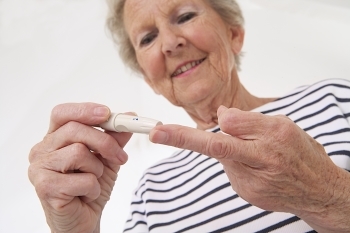Seniors Living With Diabetes
Diabetic Supplies Medicare Will Pay For
Financial Assistance for Diabetic Care

Seniors, aged 65 and older are greatly affected, with nearly eight of every 10 having either diabetes or prediabetes.
An estimated 33% of adults aged 65 or older have diabetes. This population is more at risk of developing diabetes-related complications like hypoglycemia (low blood sugar), kidney failure and heart disease than younger people living with diabetes.
Older adults with diabetes have the highest rates of any age group of lower extremity amputations, heart attacks, visual impairment, and end-stage renal (kidney) disease.
Diabetes is a very serious disease.
Over time, diabetes that is not well managed causes serious damage to the eyes, kidneys, nerves, heart, gums and teeth. If you have diabetes, you are more likely than people without diabetes to have heart disease or a stroke. People with diabetes also tend to develop heart disease or stroke at an earlier age than others.
The best way to protect yourself from the serious complications of diabetes is to manage your blood glucose, blood pressure and cholesterol and to avoid smoking. It is not always easy, but people who make an ongoing effort to manage their diabetes can greatly improve their overall health.

Medicare and Diabetic Supplies
Medicare is the national health insurance program for people age 65 or older, people under age 65 with disabilities and people with End-Stage Renal Disease (ESRD). Below is information regarding Medicare Part A, Part B, Part D, Medicare Advantage and Medigap. For more information, you may call 1-800--MEDICARE (1-800-633-4227) or visit www.medicare.gov.
Medicare Part A
Medicare Part A (hospital insurance) provides coverage for in-patient hospital stays, care in critical access hospitals, skilled nursing facilities, hospice care, and some home health care.
Medicare Part B
-
Medicare Part B (medical insurance) provides coverage for doctors' services, outpatient hospital care and some medically necessary services not covered by Part A (including some physical and occupational therapy services and some home health care).
-
Medicare Part B also covers some diabetes-specific supplies and services, including blood glucose testing monitors, blood glucose test strips, lancet devices, lancets, glucose control solutions, medical nutrition therapy and diabetes self-management training. Some beneficiaries may also qualify for coverage of therapeutic shoes.
-
Medicare Part B also covers some preventive care, including a "Welcome to Medicare" physical for new enrollees, diagnostic screenings for diabetes and cardiovascular disease, and glaucoma tests.
Medicare Part D
-
Medicare Part D is the prescription drug program available to all Medicare beneficiaries. Under Part D, you will have a variety of coverage options to help you pay for your prescriptions. Each Part D drug plan is run by a private company, and they will all look a little different from each other but they must all meet standards set by the federal government.
-
Part D coverage is optional and you are not required to sign up for it. If you chose not to join a Medicare drug plan when you are first eligible, and you don't have other creditable prescription drug coverage, you may have to pay a late enrollment penalty if you decide to sign up in the future.
-
In addition to providing prescription drug coverage, Medicare Part D ensures coverage for supplies necessary to inject insulin, including syringes, needles, alcohol swabs, and gauze.
Financial Assistance for Diabetes Care
Seniors having difficulty paying for their diabetes care and supplies can contact the National Diabetes Information Clearinghouse (NDIC)
For more information please go to: www.medicare.gov or call 1-800-MEDICARE (1-800-633-4227). Additionally, look for more details in your Medicare and You handbook which Medicare mails to beneficiaries in the Fall and which is also available at: www.medicare.gov.
Some information on this fact sheet is from www.healthcare.gov.
Source: Medicare.gov
Home | About | Articles | Resources | Site Map | Privacy Policy
Elder Options of Texas
Copyright 2001-2024
All Rights Reserved
DISCLAIMER: Links to other websites or references to products, services or publications do not imply the endorsement or approval of such websites, products, services or publications by Elder Options of Texas. The determination of the need for senior care services and the choice of a facility is an extremely important decision. Please make your own independent investigation.


